Ventral Hernia Surgeryin Northern New Jersey


Hernias will not heal on their own or “fix” themselves. Left unaddressed, they will not get better and may progress to a point that presents great discomfort and even serious medical risks. Don’t take chances.
Traditional laparoscopic/robotic techniques dictate 3-4 separate incisions and require the surgeon to poke additional holes through the abdominal wall to secure mesh. Dr. Nakhjo does not do any of this.
The overwhelming majority of our laparoscopic ventral hernia repairs only require 2 small incisions, the mere width of a finger nail. That’s it. Nothing Else.
It necessitates fewer incisions than a laparoscopic appendectomy or laparoscopic gallbladder procedure.
We do not offer robotic hernia surgery, and the rationale behind this decision is the absence of any clear advantage over laparoscopic hernia repair. Numerous reputable studies indicate that, on average, robotic hernia repairs take twice as long to complete and frequently entail more incisions compared to laparoscopic hernia repair. Furthermore, robotic surgery comes at a significantly higher cost for achieving the same end result. Robotic hernia repair proves inefficient in terms of both cost and surgical duration for the majority of hernia procedures.
Patient with large incisional hernia after major abdominal surgery 2 years prior. Patient was initially seen at a major academic center who stated to them that he would need an open repair with a "team" of surgeons and be admitted to the hospital for several days with drain placement. He was told that he could not return to work for at least 4 to 6 weeks.
Patient came to us for a second opinion and wanted a minimally invasive approach.
Abdominal wall reconstruction was performed laparoscopically with 2 small incisions. Surgery took approximately 1.5 hours and went home the same day. Patient was back at work after one week. After a one year follow up patient doing well, fully functional with no complaints.
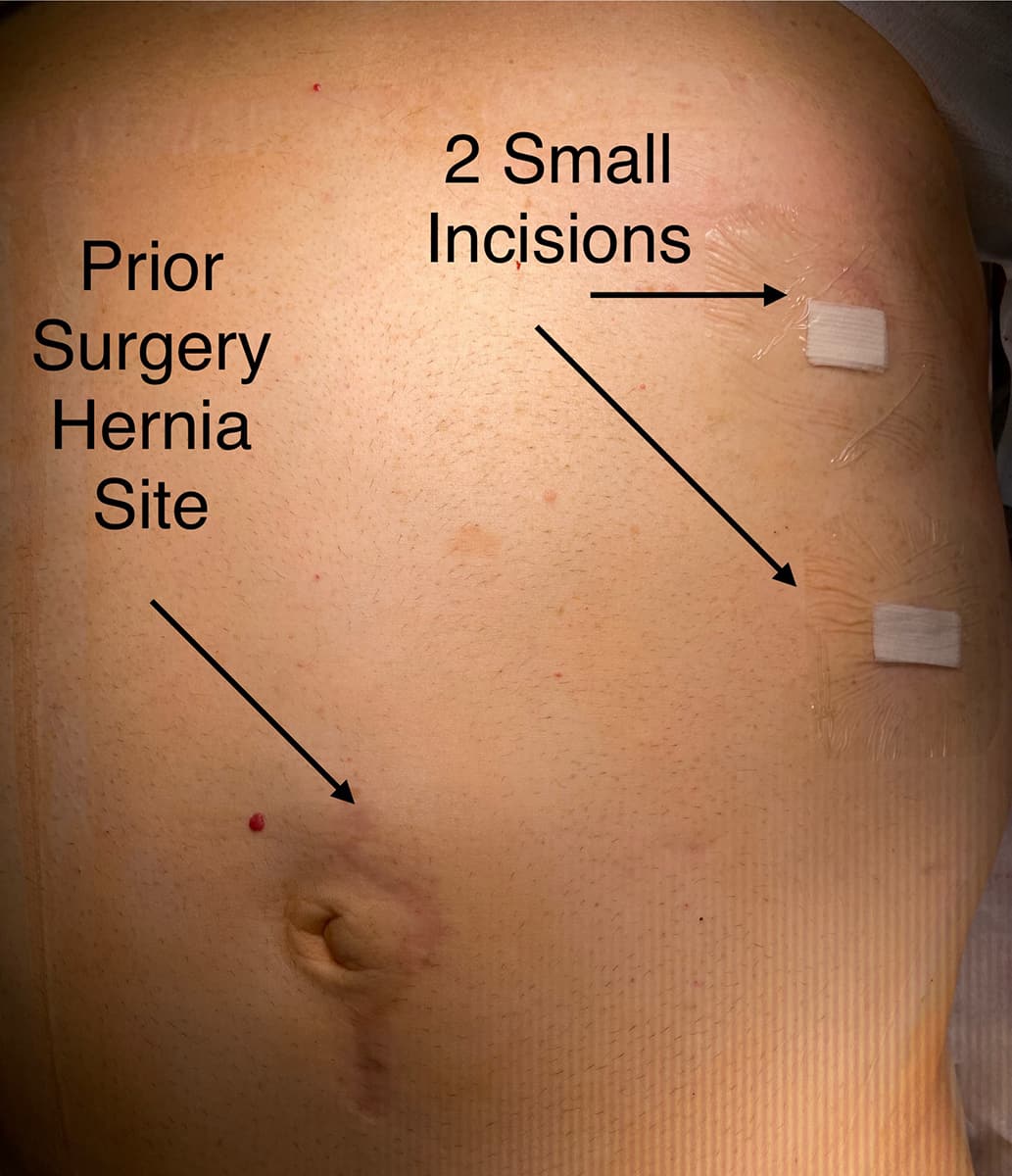
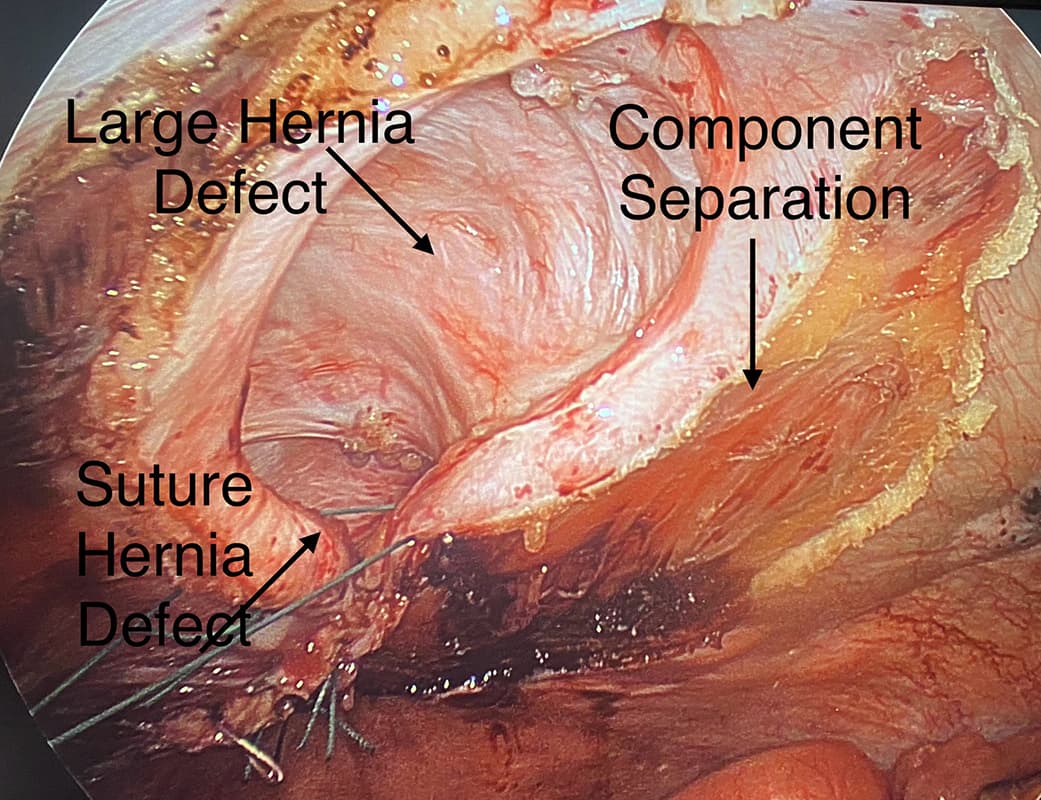
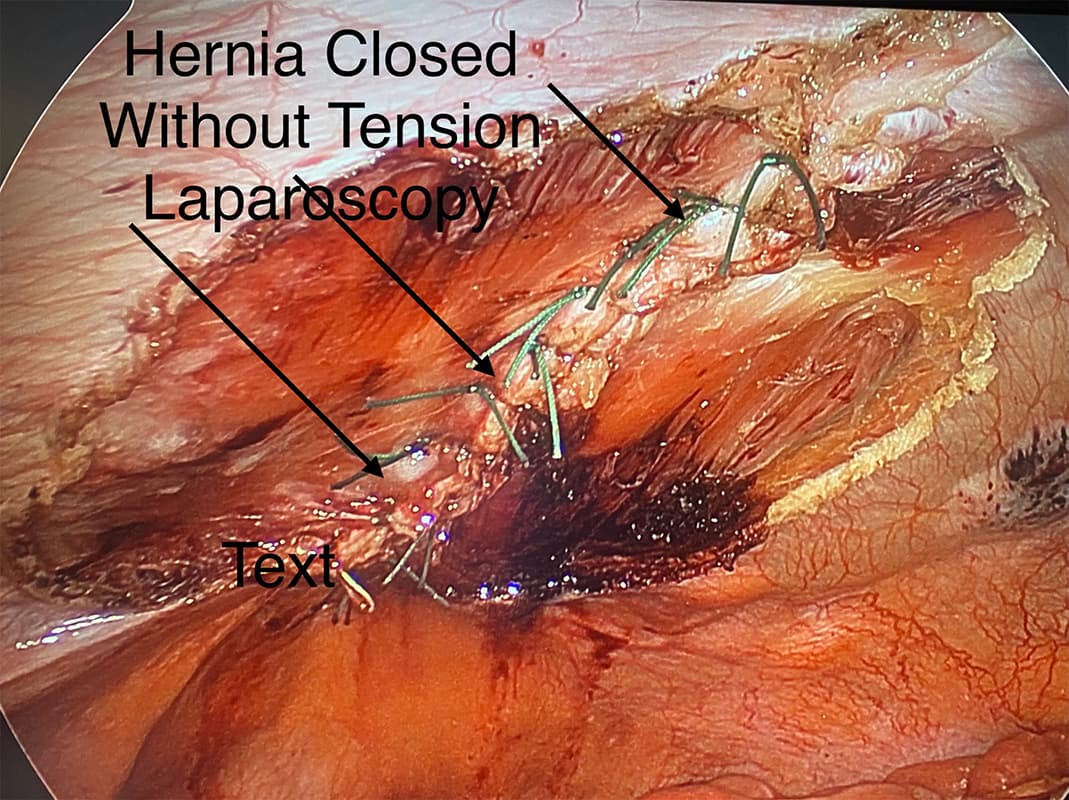
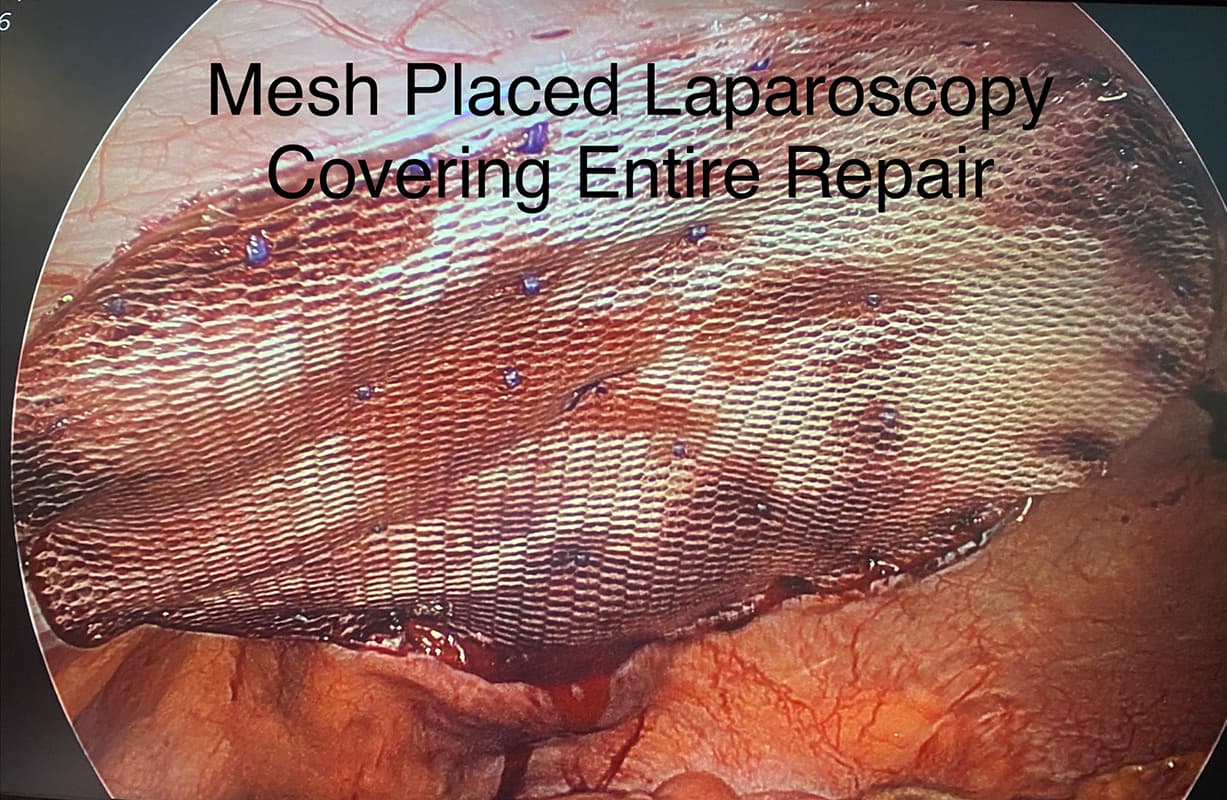
We do not place multiple sutures through the abdominal wall to secure the mesh. This creates unnecessary trauma which increases post operative pain and higher infection rates.
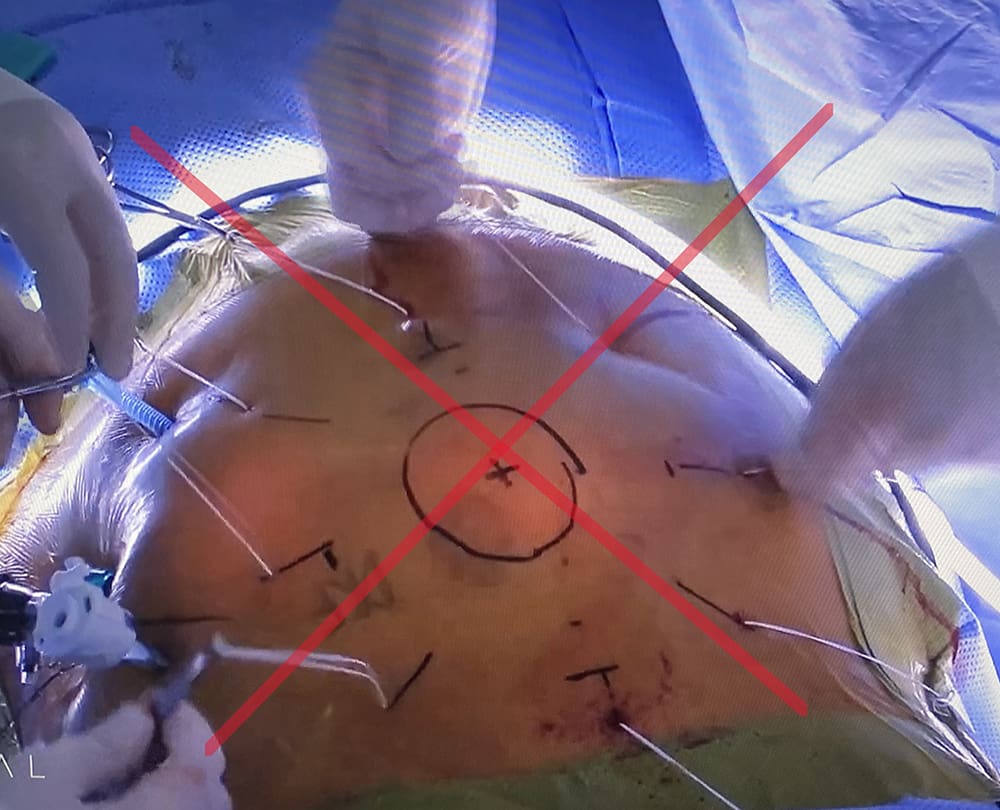
We do not place mesh over the hernia defect without closing the defect with sutures first. Failure to close the hernia defect leeds to mesh buckling through the hernia site and an unacceptably high recurrence rate. We close every hernia defect with suture then place mesh on top of the hernia defect for a "double repair" which leads to the best possible results
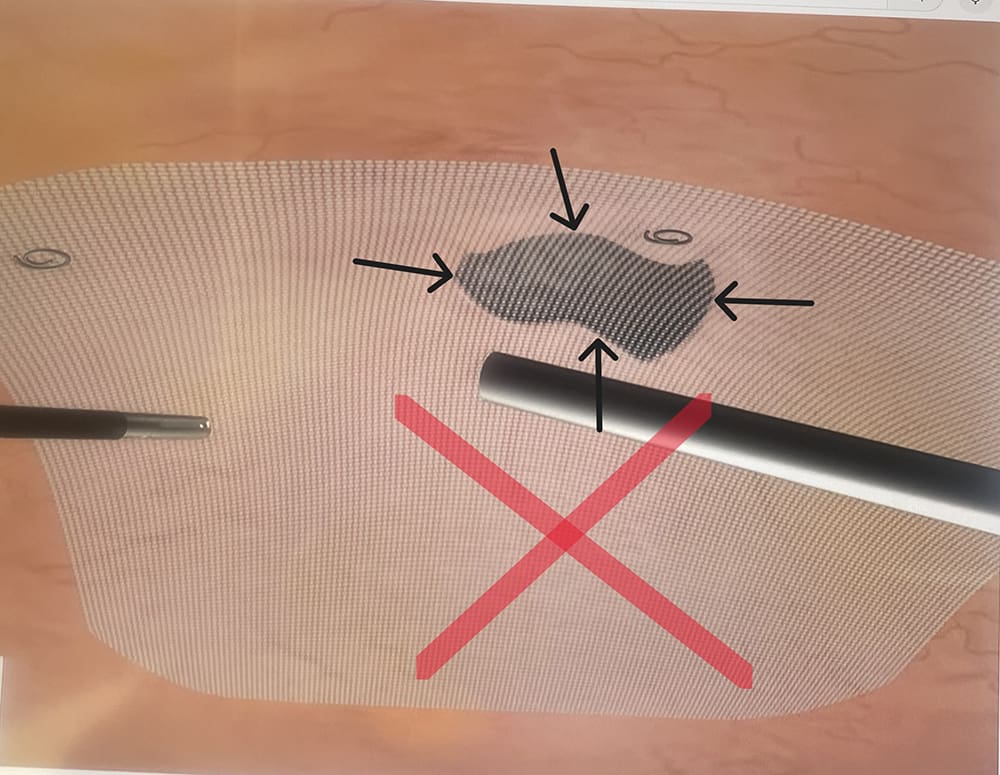
Schedule your New Jersey Ventral Hernia Repair consultation with Dr. Shomaf Nakhjo at Advanced Minimally Invasive Surgery. Dr. Nakhjo is widely recognized as one of the country’s leading authorities on minimizing the invasiveness of hernia repair surgery by using innovative techniques and technologies. He invites you to book a consultation here at advancedsurgerynj.com or by calling (973) 383-2222.
Lasting relief is attainable with Dr. Shomaf Nakhjo. Dr. Nakhjo specializes in a variety of techniques to help you live a more enjoyable, hernia-free life.
A Hernia is a muscular weakness or tear that may allow parts of internal organs or tissues to slip into or through the opening. Hernias are often painful and unsightly, and can pose medical risks.
A Ventral Hernia is a protrusion of tissue caused by a breach on the vertical midline of the abdominal wall anywhere from the breastbone to the pubic bone or groin.
There are three categories of Ventral Hernias.
An epigastric hernia presents in the stomach area anywhere from the bottom of the breastbone to the navel.
Umbilical hernias develop in the area of the belly button.
Incisional hernias occur at the site of a previous surgery. As many as a third of patients who have had abdominal surgery develop an incisional hernia at the site of their scar. Incisional hernias can appear anytime from months to years following abdominal surgery.
Ventral hernias can result from a broad range of conditions. If you have been diagnosed or suspect you have a ventral hernia, you are likely a candidate for Ventral Hernia Repair in New Jersey.
While laparoscopic surgery is not always sufficient for repair of large hernias, this “keyhole” surgery has many advantages when it can be utilized, including:
Dr. Nakhjo will always opt for the least invasive and most comfortable effective technique available.

Several days before your surgery you will be directed to stop taking all supplements or medications that may impair normal blood clotting. Your anesthesiologist will review your medical history to determine type and amount of anesthesia that’s right for you. While Ventral Hernia Repair is typically performed using general anesthesia, small hernias are sometimes repaired using a spinal or epidural block that leaves you awake, but pain-free. Most hernia repairs are outpatient procedures, meaning you can go home the same day. In some cases, you may require hospitalization for up to several days.
The greatest danger is a hernia that becomes “strangulated” when tissue gets caught very tightly in an abdominal wall opening. Strangulated hernias can cut off blood flow and cause tissue to start to die. This is a medical emergency that requires immediate surgery. Hernias tend to become larger with time, which then makes them more difficult to repair. Be sure to consult a doctor right away if you experience:
While a physical examination of your abdomen is often sufficient to diagnose a ventral hernia, your doctor may also order tests such as abdominal ultrasound, or a CT or MRI scan.
With Ventral Hernia Repair New Jersey patients should know it can involve a variety of procedures based on your unique needs. Dr. Nakhjo will thoroughly assess your concerns to determine the treatment that will deliver you with the best results and minimal recovery.
Depending on the size or type of a Hernia, your doctor may select one of three surgical repair techniques.
In “open surgery,” your doctor makes an incision near your hernia before pushing tissues back into place and sewing the area shut. Laparoscopic surgery utilizes several small incisions through which a small camera and surgical instruments are inserted into your body to guide and perform your surgery. Each of these techniques may or may not include use of mesh reinforcements. Your doctor will choose a surgical strategy based on a variety of factors, including your age, medical history, hernia size, and the presence of infection.
Following your Ventral Hernia Repair New Jersey patients will be moved to a recovery room where our medical team will monitor their vital signs until they are stable. Your surgeon will prescribe pain management medication as appropriate. As soon as you are able, it is very important that you walk around several times a day to lessen the risk of blood clots.
Ventral Hernia Repair offers long-lasting symptom relief, so you can live healthy, happy, and active. Don’t wait another day to begin your journey toward resolving your symptoms once and for all.
We’re ready when you are. Please book a conversation with Dr. Nakhjo here at advancedsurgerynj.com or by calling (973) 383-2222.

We will carefully and effectively manage your pain with any needed, safe, appropriate and effective medications.
Yes, including infection, blood clots, bleeding, and bowel injury. These complications are less than 1%.
That will depend on your medical condition, your age, and the extent of your surgery. Your doctor will provide you with detailed instructions. It’s vitally important that you follow them diligently.
All incisional hernias are a specific type of ventral hernias. But not all Ventral Hernias are incisional hernias.
Our "Ask the Dr. Anything" service is tailored to address any questions or uncertainties you may have regarding your hernia troubles. Whether you're seeking clarification on symptoms, treatment options, or our practice, we are here to provide you with comprehensive information and guidance.
Please feel free to email us at: advancedsurgerynj.com. Under Subject type “ADA'' and Dr. Nakhjo will be happy to answer your questions.
Let's navigate the complexities of your hernia troubles together, ensuring you have the support you need for a healthier tomorrow.
For the most advanced treatment, easiest recovery, and best possible results with minimally invasive surgery in New Jersey, begin your journey with Dr. Shomaf Nakhjo today. Schedule your consultation at either of our convenient locations to begin discussing your personalized treatment plan with a highly skilled and renowned area specialist.